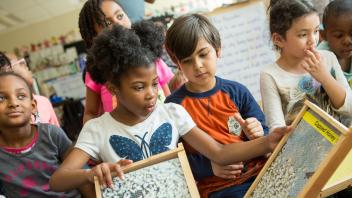Teacher question: You wrote recently that it was a good idea to teach comprehension skills, but our school district says we shouldn’t, that it’s prior knowledge that matters. Do you know the baseball study? Have you read Natalie Wexler’s research? It is really difficult to trust research when everyone tells us something different.
Shanahan’s response:
I feel your pain.
There are research results and there are interpretations of research results. What research has been done, what these studies have found, and whether these studies were any good shouldn’t be points of disagreement. But interpretations of what a study means or what actions you should take based on it are going to lead to different claims and I’m sure that is confusing.
That’s why I go to great pains to distinguish whether I’m reporting research findings or making claims based upon them. When I do the latter, I try to explain my reasoning so readers can determine whether they think my position is sound.
A few of my own rules for research interpretation:
(1) Always distinguish research results and opinions.
(2) Don’t make claims on the basis of a few studies (it’s okay to use a study as an example as long as it’s an example of more than itself).
(3) Don’t prescribe instruction unless research has found it has benefited learners (no matter how tantalizing the theories and correlations may be, don’t trust them until they have been tried).
So, what I can tell you about prior knowledge? Prior knowledge refers to the knowledge readers have in their heads prior to reading a text. There is a substantial and extensive body of research going back to Bartlett’s 1932 study that reveals that readers use their knowledge to understand text. Case closed on that (and that is not an opinion).
But what does this mean for reading instruction? That’s where interpretation begins to intrude.
One conclusion that many of us draw from the research is that it’s a good idea for kids to know a lot. The more knowledge and experience they can bring to texts (or life) the better. Instructional practices consistent with this would include providing high quality teaching in social studies, science, and the arts. Some schools — in their efforts to improve reading neglect those subjects and I think this body of research suggests that to not be a good idea.
Another conclusion that seems consistent is that we should make sure the texts we use to teach reading are meaty. Why waste time? If kids are reading, why not expose them to high quality literature and informational texts. Following up later on these readings to ensure that this valuable content is retained seems like a good idea (and this makes sense for the earlier mentioned social studies and science texts as well).
Media is another potential avenue to knowledge, and that means encouraging Carmen Sandiego and Bill Nye the Science Guy rather than Angry Birds.
Yep, there are a lot of things one could do to increase kids’ knowledge, and that, presumably, in the long run could help to make kids better readers. Not many arguments there.
But then we get to the baseball study that you mention. This is a cool study (Recht & Leslie, 1988), that was nicely done. The researchers had 7th and 8th graders read a text about a baseball game. They divided the students into four groups: good readers who were high or low in baseball knowledge, and poor readers who were high or low in baseball knowledge. They found that reading ability contributed less to comprehension success than the students’ levels of knowledge about baseball. Good readers with high prior knowledge did no better than poor readers with high prior knowledge when it came to reading comprehension. But it doesn’t prove what a lot of people seem to think it does.
It’s a provocative study alright. But it’s a one off. There aren’t other studies with this kind of finding (lots of studies show the importance of knowledge, but no other one pits reading up against knowledge in this way — interesting that this has not been replicated in more than 30 years). Not only is it the solitary study on this, it was conducted with only a single text and that one designed to be used in a research study. Kind of hard to generalize very far from that in my opinion, though obviously there are people who think this is the definitive empirical evidence on this issue (such as whoever is making policy in your district).
Would I stop teaching reading or reduce the amount of reading instruction or end reading strategy instruction because of the baseball study? Nope, I wouldn’t, but if there were an accumulation of such findings, I could be so persuaded. (Recht and Leslie themselves didn’t draw this conclusion either, though in what amounts to an afterword they speculated on what it might say about the value of comprehension strategy instruction — which, of course, they didn’t actually study — it was speculation, not a finding).
One interesting thing about this study that isn’t discussed is that the students weren’t grouped on the basis of comprehension strategy use but on reading ability. If the study results can be interpreted (and this part is entirely interpretation) to mean that comprehension strategies shouldn’t be taught, then likewise this study should lead us to reject any other kind of reading instruction (such as decoding, vocabulary, increased amounts of reading, etc.). I’m not willing to go there myself.
Knowing the importance of prior knowledge, I’d likely do what Recht and Leslie actually recommended in their study — instigating students to use their knowledge when reading. Though I would do this in a science or social studies class where I’m trying to maximize their knowledge.
Respectfully, that isn’t what I’d do in a reading class.
Here my goal isn’t to ensure immediate comprehension of today’s text, but to make kids successful independent readers. That’s where strategies come in. If I’m always providing kids with the appropriate background knowledge to understand each text used for instruction, then how do students ever learn to take on a text on their own? And, what can they do to take on texts for which they don’t already have a bunch of relevant knowledge?
I’m not satisfied with the claim (and this is a claim, not a research finding) that readers can’t understand texts unless they have a lot of background knowledge. If that were true, we could never negotiate cultural boundaries or go beyond our very limited life experiences.
Cyndie and I have spent the past couple of years reading classical works of physics, biology, economics, philosophy of science, communications, political science, philosophy and history — works that we clearly have insufficient background for. But you know what? We’re able to make sense of them, albeit not as easily as we can take on a crime noir story of Dashiell Hammett or Anne Tyler’s latest novel.
That’s where strategies come in. They let readers in on the secret that if you are intentional and strategic you can make sense of texts, even if you lack the background for them. That’s why some smart people embrace reading as a “vaccine against populism, racism, and nationalism” (Mario Vargas Llosa, 2010); reading is more than finding information in texts that agrees with what we think we already know. It allows us to break the bonds of experience, superceding what we know.
There are literally hundreds of studies showing that teaching certain strategies improves reading comprehension, so, despite any claims to the contrary, I do encourage the teaching of such strategies. However, for the most part these studies are brief. They show the value of strategies, but they don’t make the case that strategy instruction alone is the way to go or that we should invest lots of time in strategy teaching.
Given the great emphasis on knowledge as the source of reading comprehension, there is one strategy I’d really like to see emphasized more.
That is teaching students not to believe too deeply in their prior knowledge. You see, research not only shows that knowledge contributes to comprehension, but to miscomprehension as well (a research result, not an opinion). Readers need to be more open to what authors have to say without allowing current “knowledge” to dominate the process.
Show me a reader (or listener) who views communication and learning as being mainly about applying one’s knowledge, and I’ll show you unbridled egotism and unnecessary misinterpretation. Self-skeptical reading is the opposite of knowledge-dominated reading and we ought to make certain that kids both know a lot and that they are not entirely self-satisfied in their knowledge.

